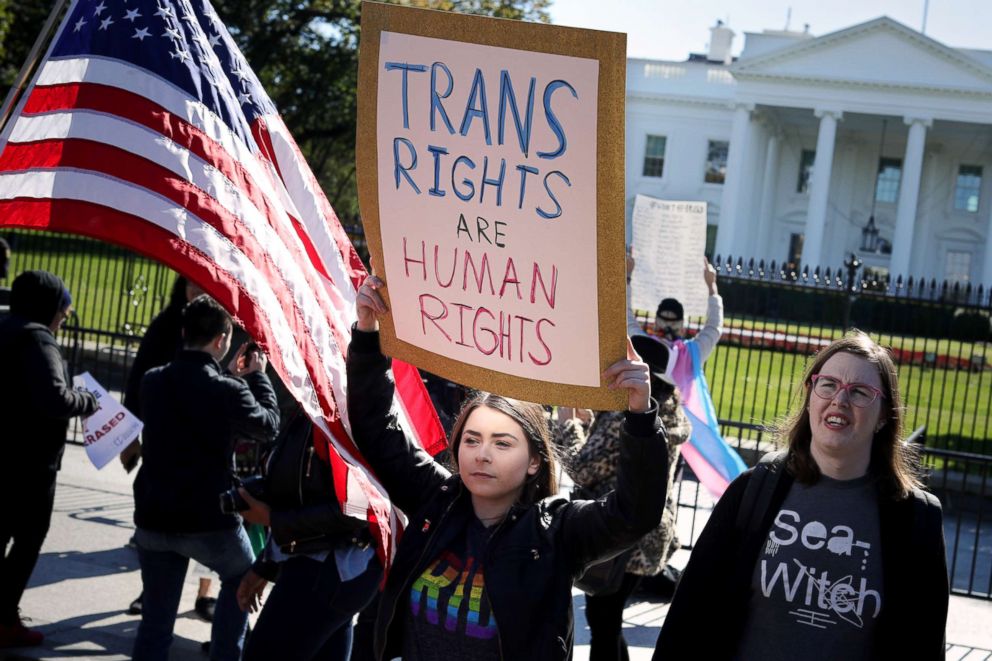North Carolina transgender community watches Trump administration with concern
HIGH POINT, N.C. -- The Trump administration reignited the national debate over transgender rights when its secret proposal to change federal policy was revealed last week. But in North Carolina, the fight over protections and coverage for transgender persons never abated. Here, the state is already implementing some of the same sorts of policies the federal government is now proposing, with real consequences for real people.
The federal proposal is still relegated to the pages of a memo. But in North Carolina, the proving ground for all sorts of legislation affecting the transgender community in the past few years, recent changes to state regulations give a preview of what might happen on the federal scale if the Trump administration did follow through with its proposed changes.
The document, first reported on by the New York Times, contemplated establishing a legal definition of “gender” under Title IX which bans discrimination on the basis of gender and is geared towards educational institutions.
The administration would, according to the New York Times, “define gender as a biological, immutable condition determined by genitalia at birth.”

It would be a response to regulations imposed during the administration of Barack Obama, which expanded Title IX protections for transgender people, including allowing students to use the bathroom that corresponded to their gender identity.
The Obama-era regulations are still being debated in federal court.
“That court found that the Obama administration regulation was overbroad and inconsistent with the text of the 1972 Title IX law prohibiting discrimination on the basis of sex. The court order remains in full force and effect today and HHS is bound by it as we continue to review the issue,” a statement from an HHS spokesperson read, in part.
Chad Griffin, president of the LGBT rights group Human Rights Campaign, said in a statement responding to reports of the plan, “the Trump-Pence administration intends to erase LGBTQ people from federal civil rights protections and eviscerate enforcement of non-discrimination laws.”
North Carolina’s treasurer Dale Folwell did not wait for guidance from the federal government before making changes to the way the state recognizes transgender people under the law. After he was sworn in 2017, he removed coverage for transition-related procedures like gender reassignment surgery and hormone therapy from the state health plan, which insures teachers and federal employees. The Obama administration started mandating such coverage the year before.
That decision has had a profound impact on sixteen-year-old transgender boy Connor Thonen-Fleck, who began hormone therapy a year ago, about six months after he began expressing himself as male. His parents, both employees at the University of North Carolina at Greensboro, have to pay for the hormone treatments out of pocket. And Connor’s hoped-for chest reassignment surgery is now out of reach for them without insurance coverage.
“Surgery is life-saving for me. And I don’t see why or how it could be justified, when the suicide rates are as high as they are in the transgender community, that people could deny it,” Connor told ABC in an interview.
A 2018 study published by the American Academy of Pediatrics that surveyed transgender and cisgender – a term describing people whose gender identity matches their biological sex – adolescents found that more than 50 percent of transgender male adolescents had reported suicide attempts, compared with 10 percent of cisgender boys.
Beginning in ninth grade, before he started transitioning, Connor entered a dark place, Alexis said. He was self-harming, refusing to eat, bathe or get out of bed, and had suicidal thoughts.
“By the summer, he told us what was going on. We were able to accept it easily because we had already witnessed his mental and emotional health improving significantly. When no traditional treatment worked - expressing himself as a male did,” she said.
Connor and his mother are actually not overly concerned that the federal government is on the cusp of making sweeping policy changes because they believe the Trump administration has failed to follow through on so many of its pledges on social issues so far.
“I think it’s just more talk and inflammatory statements,” Connor said.
But back at the state level, members of the transgender community here -- veterans of previous fights -- would be ready to mobilize against national changes. In 2016, then-Gov. Pat McCrory, a Republican, signed into law House Bill 2, the so-called “bathroom bill,” which prevented transgender people from using public restrooms that corresponded to their gender identity. The bill was later repealed, and McCrory’s successor, Democrat Roy Cooper, signed a compromise bill in its place which put a two-year moratorium on local non-discrimination laws.
“I think that public discourse around HB2 enabled or emboldened a lot of people to talk about trans people in a dehumanizing way that they might not have otherwise felt it was socially acceptable to give voice to,” Ames Simmons, policy director at the advocacy group Equality North Carolina, told ABC.
With the memo, Simmons, a transgender man, said administration officials “certainly are broadcasting an intent to further discriminatory treatment of trans people,” although he also noted that there are basic protections in the Constitution which could form the grounds for legal challenges to plans like those leaked last week.
More immediately, now that the head of the executive branch appears to share the same views on transgender issues as some of North Carolina’s top officials, Simmons, a transgender man, said it appears to have given the green light to those state officials to use language that demeans the rights of transgender people.
He said that before the memo was revealed, Folwell, the state treasurer mainly justified it in economic terms, even though an estimate from the consulting firm Segal Group showed it would only save the state $850,000 at most. But now, post-memo, the language used appears dismissive of the recognized medical condition, gender dysphoria, which gender reassignment surgery addresses.
“I’ve seen [Folwell’s] statement shift to more of a tenor of ‘no one seems to agree on whether these benefits actually should be provided’ when that’s just wrong,” Simmons observed.
In a statement released last week, Folwell said, “We empathize with all members’ health conditions, but cannot provide them all with every elective, non-emergency procedure they want.”
Folwell’s use of the word “elective” to describe transition-related surgery contradicts the mainstream consensus in the medical community and among insurers.
In fact, the corporate medical policy of Blue Cross Blue Shield of North Carolina, the state’s largest insurer, explicitly deems such procedures medically necessary when the candidate meets a set of criteria.
While gender reassignment surgery is recognized as medically necessary, public opinion on transgender rights is less cut-and-dry.
A 2017 poll from the Public Religion Research Institute found that 53 percent of Americans surveyed opposed laws requiring transgender people to use bathrooms that correspond with the sex on their birth certificate, and that 39 percent favored such laws.
The North Carolina Values Coalition, a socially conservative organization, applauded the Trump administration’s potential changes, saying they reflect national sentiment towards transgender people.
“The Obama administration, in trying to redefine what it means to be a man and a woman, overstepped just like the transgender community did,” Tami Fitzgerald, the executive director of North Carolina Values, said in an interview. “The majority of people in this country want their privacy and their safety protected and they don’t want a small minority group’s so-called rights to be elevated above theirs.”
None of the stakeholders in the North Carolina transgender debate that ABC interviewed believed the issue will be a major factor for voters in the upcoming midterm elections or in 2020. But Simmons noted that every legal challenge for the North Carolina transgender community has only galvanized it -- and that they would be ready to respond to federal decisions, too.
“People feel a sense of moral responsibility to do the right thing here, that it’s not a political football. It’s about acknowledging people’s existence,” he said.
Connor Thonen-Fleck is among those stepping up publicly. Last week, he and Alexis testified before the state health plan’s board of trustees, urging them to reinstate coverage for procedures like Connor’s chest reassignment surgery.
“I feel very proud of Conor and I feel he’s very brave,” Alexis said of her son. “He didn’t want to be Connor the transgender young man who was speaking out against discrimination. He just wanted to be Connor. And he hasn’t had much time to do that.”




